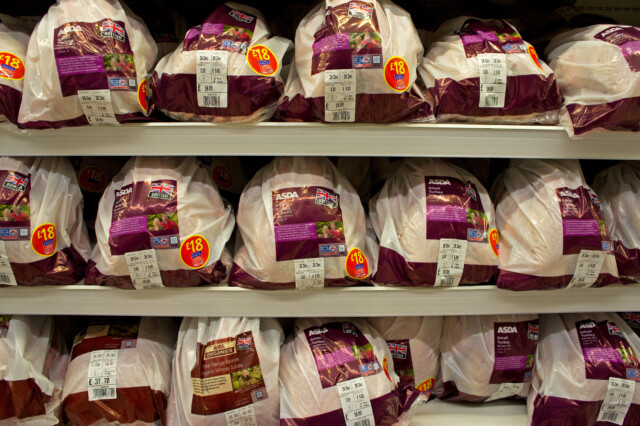CHRISTMAS turkeys could cost double in the run up to the big day amid major shortages.
Half of British free range birds have already been wiped out or culled by the “worst bird flu outbreak ever seen” which could send prices soaring.
Christmas turkeys for sale in an Asda supermarket
To fill the gaps on the shelves, supermarkets are expected to buy in turkeys from abroad – but at a considerable cost.
In Poland, for example, import prices have more than doubled and this could be reflected in UK store prices, the Daily Mail reports.
British Poultry Council chief executive Richard Griffiths told the Environment, Food and Rural Affairs Committee: “This year is the worst bird flu outbreak that we have seen, ever
“We don’t know how the gaps within retail are going to be filled at this point.”
Asked what that might mean for prices this Christmas, he said: “I don’t know. That’s really a question for retailers.”
Total UK turkey production for Christmas was around 8.5 to 9 million birds, but around a million have so far been culled or died from bird flu, he said.
And the usual amount of free range birds for the festive season is around 1.2 to 1.3m, but 600,000 of these have been directly affected.
Poultry farmer Paul Kelly, of Kelly Turkeys, warned demand for birds will be high – but he was more optimistic about the financial impact on consumers.
He told the committee: “I don’t think UK turkey prices will be going up.
“I think it will just be a supply issue rather than the prices being hiked.
“But there will be a big, big shortage of British free range turkeys on the shelves this year.”
Some 1.6m birds have been culled as of November 20 directly because of bird flu on farms, Mr Griffiths told the committee, with around 36 per cent of poultry farms affected by the outbreak.
Mr Kelly described the situation as “devastating” for farmers.
“The challenge for a lot of the smaller seasonal producers that produce Christmas poultry is they have their Christmas flock on their farm and when the turkeys are infected they all die within four days,” he said.
“To give you an example, we had one farmer with 9,500 (birds).
“The first infection was on Thursday evening, 20 mortality, and by Monday lunchtime they were all dead.”
Mr Kelly added: “We’re a small business and we’ve lost £1.2m this year – just turkeys that have died.
“Luckily we’re going to get through to next year but can we take the risk to grow Christmas poultry based on what we’ve seen this year? We couldn’t.
“And had I known what I know now we would not have grown the turkeys we did.
“Looking to next year, I don’t want to put the farm at risk.
“Without a vaccine in place or a compensation scheme that is fit for purpose, I don’t know whether we’d have the confidence to grow Christmas poultry next year.”
Mr Griffiths added: “This year the seasonal producers have been so badly affected.
“I can see many of those taking a good hard look at whether they want to be in Christmas poultry.”
A Defra spokesperson said: “These outbreaks are understandably very concerning for the impact they have on individual turkey farmers and we are working closely with them to provide the support they need.”
Most major supermarket groups have so far been relatively relaxed about turkey availability come December.
In October, Tesco said it expected to be able to satisfy demand, while Sainsbury’s said earlier this month it had ordered more turkeys for 2022 to give it a buffer in case the crisis hindered supply.
Marks & Spencer, which typically sells one in four fresh turkeys consumed at Christmas, said it had strong plans to protect supply.
Dead turkeys are loaded onto a JCB at Redgrave Park in Suffolk








